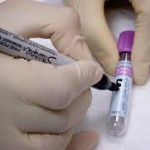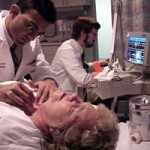If you like this blog, send it to 3 (or more) of your friends and encourage them to sign up. Let’s keep the conversation going!
Drug Trial Travails
I’m a participant in a clinical trial for an ALS drug. The trial goes by the catchy name  “Biogen 223AS302 Dexpramipexole.” Let’s just call it the trial. It’s a randomized double-blind trial, which means that neither I nor the medical team knows whether the little white pill I take twice a day is the drug being evaluated or the placebo.
“Biogen 223AS302 Dexpramipexole.” Let’s just call it the trial. It’s a randomized double-blind trial, which means that neither I nor the medical team knows whether the little white pill I take twice a day is the drug being evaluated or the placebo.
To keep track of what impact the drug is having on patients of a degenerative disease like ALS, a lot of follow-up tests are done to measure things like lung capacity, muscle strength, heart and liver function.
And, since it is not known whether a given patient in the trial is getting the drug or the placebo, these follow-up tests are done on everyone. To do them all takes about half a day, and a lot of energy. Since ALS patients like me tire quite easily, it’s particularly ironic – if not downright annoying – that these follow-up tests are so exhausting.
The muscle strength test involves having a hand-held device applied to various muscles. My job is to resist the pressure applied through the device as much as possible. The lung capacity test involves having a mask pressed hard to my face while the very nice nurse holding it there also holds the back of my head and encourages me to breathe as deeply as I can, and then exhale as much as you can. This exercise is repeated at least 3 times.
Some of the follow-up tests are done every month, though not as extensively in each instance as in this half-day marathon.
These tests are not only exhausting, but for the most part they measure things about my function in ways that are meaningful to the drug company (Biogen) but not so much to me or my care providers. So, this half day of tests does not substitute for the half day in the ALS clinic where care providers focus on me instead of the things being measured in the trial.
To Trial or Not to Trial?
As I contemplated these tests on the day before I had them recently for the second time, I seriously considered dropping out of the trial. I wasn’t sure then (and am still not sure now) why I should spend so many precious hours being put through this drill. I know I’m participating in the trial because we desperately need better drugs for ALS. And I know that clinical trials are the only way to get them. But I also know that I want to spend the time and energy I have doing things I love. As you might imagine, breathing into a mask held to my face is not on that list. It’s not that I wasn’t told about the follow-up tests as
part of the informed consent process for the trial, but living through them is a very different experience from reading about them.
Now that I have the experience, I wonder whether it might be possible to find other less exhausting means of collecting information needed to ascertain whether the drug in this trial or any trial meets the FDA requirements for safety and efficacy.
Botox Adventures
On a different front, there are the things I consciously choose to do to try to improve the quality of my life with ALS. Take, for example, my efforts to improve my speech temporarily with injections of Botox into my larynx. The theory is that some ALS-related  speech problems are caused by spasticity in the vocal cords and that Botox can control that problem by “freezing” the action part of the cords. This is a temporary fix that, if it works, can help people enunciate words more clearly. It requires a good deal of evaluation up front to see if it might work. Injections are repeated every 3 months or so as long as it’s working (because the effectiveness wears off over time). Botox ultimately stops working altogether when, as ALS progresses, the muscles that control the vocal cords stop working.
speech problems are caused by spasticity in the vocal cords and that Botox can control that problem by “freezing” the action part of the cords. This is a temporary fix that, if it works, can help people enunciate words more clearly. It requires a good deal of evaluation up front to see if it might work. Injections are repeated every 3 months or so as long as it’s working (because the effectiveness wears off over time). Botox ultimately stops working altogether when, as ALS progresses, the muscles that control the vocal cords stop working.
The up-front evaluation tests for Botox include visual examination of the muscles affecting my voice, injection of lidocaine into my larynx to mimic the effect of Botox, and a barium swallowing test (to make sure my swallowing, which is also affected by ALS, will not be adversely affect by Botox). The barium test requires standing in profile before an xray machine and swallowing barium-based substances of differing consistencies. While my swallowing is not perfect, it was evidently good enough on the day of the test not to raise serious concerns about the possible impact of botox on my swallowing.
EMG: Torture Masquerading as Medical Care
There’s one more up-front evaluation for the Botox thing, and this is a humdinger. It’s called called an EMG (electromyography) of the muscles of my larynx. I had an EMG months ago of my leg and arm muscles, and I hated it. It involved putting needles in my muscles, and running small electrical currents through them to determine how well my
nerves communicate with my muscles. Though no electrical currents are run through the needles for the laryngeal EMG, having needles placed in my throat and moved around to measure nerve conduction was more than little bit uncomfortable. By the time the doctors (there were 5 of them in the room – 2 of whom were in training) placed the needle in my throat for the 4th time, I was done, and told them to stop. I also told them that I wanted just 5 minutes in the same room with whoever invented this damned test.
Before I would even consider the Botox injection that was to follow, I needed to know whether I would need to have another EMG for subsequent injections. The answer was, thankfully, no. By comparison to the EMG, the injection of the Botox seemed almost a non-event. It was briefly painful, but it was over in 5 seconds.
Almost two weeks later, I think I have had some help from Botox with articulating words, but my voice projection is worse, and so is my swallowing. Whether the swallowing problem is from the Botox or the disease, I can’t say. I’m not sure the benefits of Botox are worth the trade off for me. Another choice to make when I see the doctor for follow up.
Can We Do Better?
In the clinical trial setting, tests are imposed to advance the purposes of the trial. In the treatment setting, tests are imposed to assure that the treatment will, at a minimum, not be harmful. Whatever the setting, there has to be a better way to help people who are sick than to torture them with exhausting and painful tests.
© Barbara A. Brenner 2011




This is quintessentially you, and it’s always a pleasure to see the quintessential you. Whatever you do will be the right thing for the right reasons, and you will be as intelligent and as clear-eyed as one can be in making the choices. If the medical trial is not being done in a way that minimizes the burden on the patient participants, I hope you can figure that out for them and influence future trials if not this one.
Guinea pigs are objects not subjects. You, my dear, are a subject, a soldier or an explorer, not a guinea pig. db
OH BARB…. my heart aches for what you are going through. Sometimes LIFE is just so stinkingly unfair. You have my thoughts and best wishes….. and LOVE….. -susanL2
Barbara, you continue to amaze me. I doubt that most, if any other people involved in a clinical trial would think about whether some procedures in the clinical trials could be changed and still meet the needs of the FDA and the R&D of the drug companies. You are persistent enough and knowledgeable enough to at least broach this, and perhaps make a difference.
I’m sorry that the testing to see if Botox was an option was so horrible. I wish you could have had those five minutes alone with the person who devised the test, and I hope that you were thinking about what you would do to him/her while the test was being performed!
What you are going through is awful, but the fortitude and grace you bring to it is something that we all admire.
As I said to a group of lawyers only today…get a grip, focus up….this is not rocket science and a good thing because if it was you all would have blown yourselves up….of course there is an easier way….
Thank you again for my patient care lesson. Shouldn’t some medical/nursing school use your blogs as a study guide? I think they would be very instructive for those contemplating a life of caring for those who are unwell and tired.
When I read “I also told them that I wanted just 5 minutes in the same room with whoever invented this damned test” I laughed out loud. My God, you are tough. This post should be required reading for all research docs. I’m thinking about you, Barbara.
Having a fetal incurable illness is not for the faint of heart. Those folks turn their face to the wall, and die. You, my dear, have a huge heart and strength. So You get to Suffer! And be a guinea pig. Make it count. That’s who you are. And you like to write with a Voice..even if that Voice is crabby. And here you thought Cancer Sucked! They all suck,
I don’t think with the urgency of finding a cure or to delay ALS that giving a placebo should even be considered. I applaud your courage going through this clinical trial and am glad you know when to say enough!
Positive healing energy is always headed your way.
Barbara, First let me thank you and the rest of the ALS Guinea Pigs. You are critical to finding new therapies to slow or stop our ALS progression. I’m a 7 year PALS with relatively slow progression, thankfully. But the exclusion criteria eliminates me from virtually all trials or I would be happy to join the Guinea Pig Club. Although you make a compelling case for passing on the botos. I pray your trial produces in some promising results. God bless you Guinea Pigs for your courage and dedication.
Yes, yes, but what does this all do to your hair?
You are amazing, dear Barb, and I’m sorry you have to go through all this. Your strength and consideration for others is so great. Thank you for taking the time and effort to keep us informed and thinking about the issues of health care.
hello to a fellow trialer. I started the same trial across the country in Boston. Every other month they send a visiting nurse to my home, much less tiring. I’m 56, bulbar and hand onset just a year ago, so like you I am facing losing my voice and my ability to type (forget writing by hand) at the same time. http://web.alsa.org/goto/sueboocrew
I know Walks are not your fave, but I am finding it a good way to raise awareness in my neighborhood.
sending good vibes from Maine for our mutual journeys!
Sue